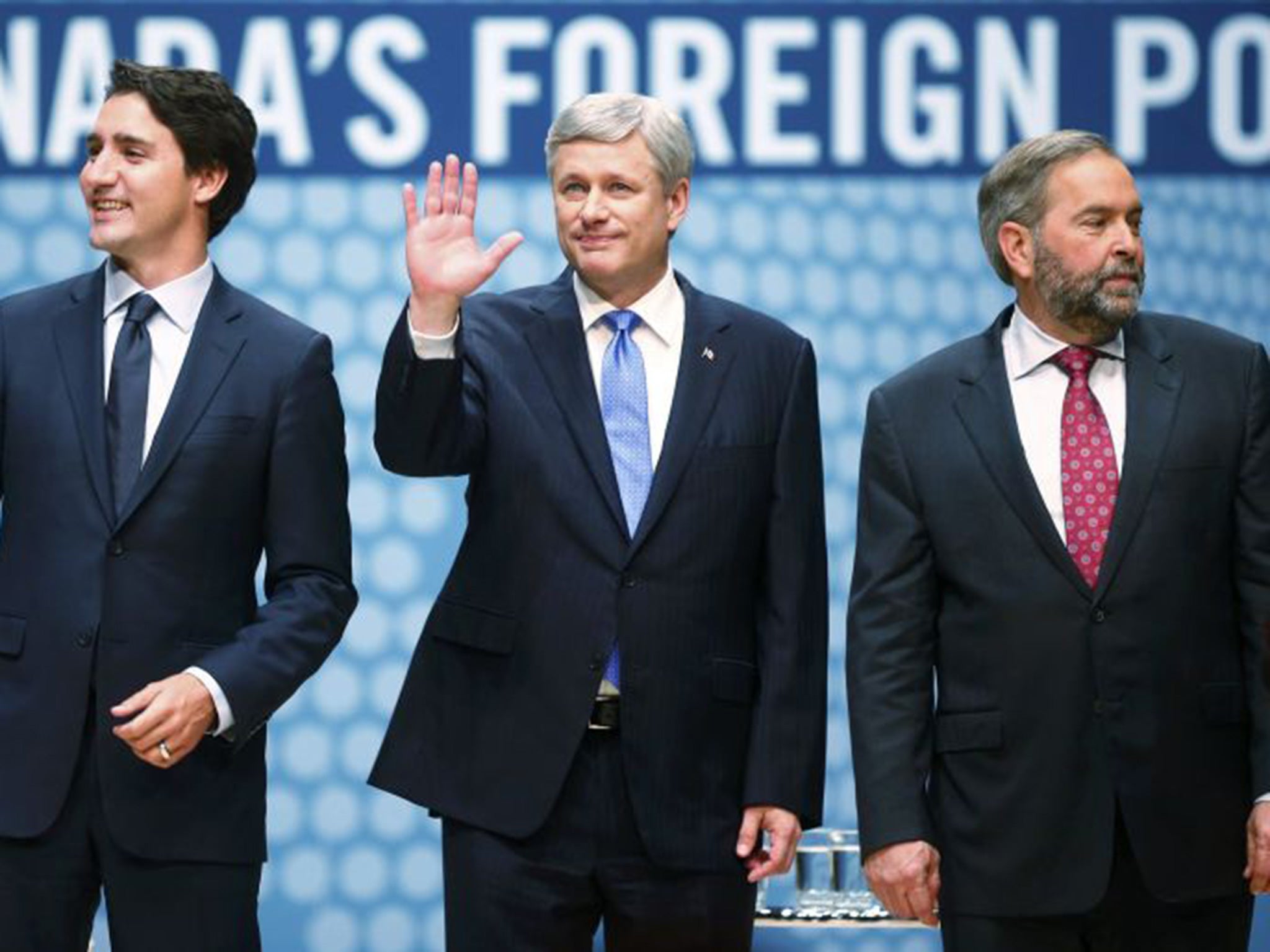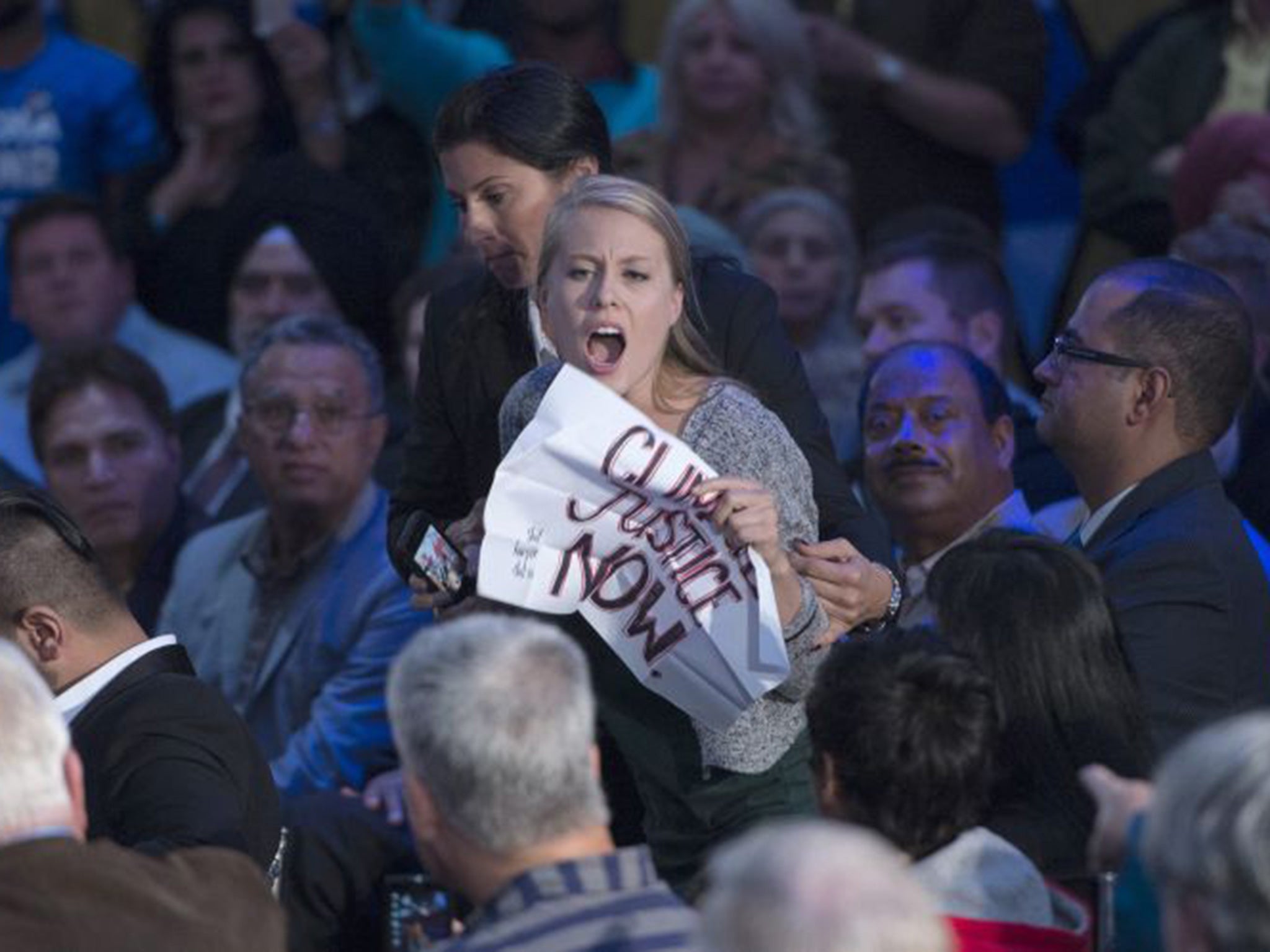Canada elections: Anti-Muslim prejudice is a nasty theme of campaigning as the liberal nation's democracy loses its way
Something has gone profoundly wrong with the country Winston Churchill once called 'the linchpin of the English-speaking peoples,' reports Robert Fisk

Faithful ally of Britain in two world wars, peacekeeper to the world, Nato but neutral across the globe, it’s difficult to believe that Canada’s democracy might have come adrift. But the last weeks of election campaigning by Stephen Harper’s ruling Conservative party – with its dark, racist overtones and anti-Muslim rhetoric -- suggests that something has gone profoundly wrong with the nation which Winston Churchill once called “the linchpin of the English-speaking peoples”. The Canadian prime minister’s avowedly anti-Muslim, pro-Israeli statements and his immigration minister’s insistence that Canadians should “keep an eye” on their neighbours has prompted voters to question what sort of country their children will inherit after the 19 October election.
Opinion polls – as fickle in Canada as they are in Europe – favoured a Harper victory over Thomas Mulcair’s New Democratic Party (NDP) and the Liberals of Justin – son of notorious prime minister Pierre – Trudeau, although the Conservatives might end up leading a minority government whose right-wing ambitions could be blunted by the opposition. Yet observing the election campaign in Canada over the past two weeks, it is impossible not to be struck by the near-insanity of the debates which will define the country for the next four years.
Instead of ensuring Canada’s place in the world, its long-standing traditions of UN peacekeeping and its multicultural, democratic inheritance, Harper’s mob have spent the last four years abandoning Canada’s partnership in nuclear disarmament negotiations and development links to Africa, have lost a traditional Canadian seat on the UN Security Council and ignored the debate over climate change. In their place, the prime minister has brought in new laws to limit personal freedom, to prevent Canadian expatriates from voting after five years abroad; he has divided his countrymen and women into “old stock Canadians” and new citizens, demonised as anti-Semitic anyone who criticised his approval of Israeli policies and launched a legal campaign against one of only two women in four years who sought to wear a Muslim ‘niqab’ partial face-covering during her citizenship ceremony.

While joining Washington’s fruitless bombing campaign against Isis, Harper signed off on a £10 billion arms contract to supply armoured vehicles to Saudi Arabia, a country from which massive funding has found its way to Islamist groups in both Syria and Iraq whom Harper regards as enemies. Condemned by Amnesty International, Harper defended the deal – with General Dynamics Land Systems Canada – by claiming it was the greatest contract of its kind in Canadian history, that 3,000 jobs depended on the sale and that while repeatedly “condemning the government of Saudi Arabia for its treatment of the rights of man”, he would not “punish” Canadian workers. “It’s normal for our country to condemn the practices of Saudi Arabia,” Harper said by way of justification, “but at the same time, we have to make business and create employment for our workers here – you have to do both things.”
More jobs, more houses, lower taxes have always been Tory campaign promises in Canada, and Harper has shrewdly outwitted Messers Mulcair and Trudeau. The latter wants to tax the rich to broaden the middle class while Mulcair would prefer higher taxes for all to increase welfare spending, especially on the poor – but both advance centre-left policies, the Liberals promising to run a deficit for a few years, the NDP a balanced budget, even increasing defence spending. The two thus spent much of their time in tripatite pre-election broadcasts attacking each other -- while Harper watched them, largely silent, with a shark-like but understandable smile.
Desperate to prove his own liberal credentials, Mulcair questioned the Saudi arms deal and immediately angered Unifor, Canada’s largest private sector trade union. Both he and Trudeau supported Zunera Ishaq’s right to wear the ‘niqab’ at her citizenship swearing-in – only to find that a majority of Quebecois and a lot of Anglophone Canadians were stirred by Tory claims that she was deviating from Canada’s “values”. Conservatives with a capital ‘c’ have always known how to capitalise on the fears and security of conservatives with a lower case ‘c’ – ‘old stock Canadians’ no doubt, who have shown no interest in Harper’s steady cut in grants to academic and artistic institutions whom the Tories regard as too intellectual or not sufficiently pro-Israeli.
“The niqab is a distraction – a culture war fabricated to take voters’ minds off the real issues in this election,” the centre-right Toronto ‘Globe and Mail’ announced in an editorial. “Don’t fall for it. Wearing a veil is one thing – wearing a blindfold is another altogether.” But Canadians may indeed be falling for it. A Canadian Ipsos poll showed that 71 per cent of Canadians believed that Canada’s “security” could not be compromised and that Syrian refugees should be screened “to make sure they aren’t terrorists” – the Tories’ buzz-word for instilling fear – even “if this slows down their admission to Canada”. This raises a bleak question, as Margaret Wente of the ‘Globe and Mail’ pointed out: are Canadians more xenophobic than they were when they compassionately brought 50,000 Vietnamese boat people to Canada -- a gesture long delayed, by the way, by Justin Trudeau’s cold-hearted father Pierre?
Or is it that Harper’s belligerent response to international crises – sending Canada’s soldiers to fight and die in the Afghan cemetery of empires, to train the dodgy Ukrainian army, to participate in the bombing of Syria – is providing a quick fix to the country’s desire to reassert its power in a world in which even the United States has turned down the lucrative Alberta oil pipeline to the Mexican Gulf, a project which was originally billed by the Tories as a windfall. Harper’s promise to increase the number of home-owners by 70,000 in five years came without any explanation of how the tax incentives necessary for such a scheme might be raised.
But these are mere nuances compared to the deep unease which many Canadian liberals and intellectuals now express about the future of their country. The highly respected ecologist David Suzuki has called Harper a “dictator” who ignores global climate change for the purpose of transforming Canada into a “petroleum superpower”. Harper spent five days in the Arctic without once mentioning climate change, and Muclaire and Trudeau – according to Suzuki – are more interested in getting re-elected or developing Canada’s oil sands than in the future of the planet. This philosophising, which applies to almost every western democracy, has been accompanied by a more obvious fear that basic human rights would continue to be eroded by another Harper government. It was his Tory administration that banned George Galloway from entering Canada at the end of a peaceful American lecture tour. It was the Harper government that removed the charitable status of several organisations critical of Israel – or of Canada’s blind support for Israel – although it usually provided other justifications for its actions.
Critics have claimed that Harper’s almost obsessive support for Israel – he uttered not a word of condemnation during last year’s bloodbath in Gaza – is an attempt to harvest the Jewish vote in Canada. Former foreign minister John Manley told me that Harper “is an intelligent man and says what he does from the heart”. Yet this is itself disturbing. If Harper was not speaking for a Jewish minority in Canada when he pledged his country’s unconditional support for Israel, then he was representing Canada’s foreign policy based solely on his personal convictions. This same bias appears to lie behind the Conservatives’ constant desire to accept Christian rather than Muslim refugees from Syria – and to warn of the danger that ‘terrorists’ may be among those fleeing Syria. There’s even a new law on the books that would have Canadians arrested for travelling to “terrorist-controlled” territories unless they can prove they are NGOs or journalists. What, then, is to happen to the thousands of Syrian-Canadians visiting families in the Middle East who, through no fault of their own, live in Isis-controlled lands?

Election ads have been making fun of the hair-styles of Trudeau and Harper – Trudeau’s floppy mop versus Harper’s white thatch – but when Margaret Atwood, the country’s most popular internationally-read novelist, wrote a gently mocking article for the right-wing ‘National Post’ about the prime minister’s hair, her short essay appeared – and then immediately disappeared – from the ‘Posts’s’ website. “Of the three national male leaders, which one travels with a personal grooming assistant – lavishly paid for in whole or in part by you, gentle taxpayer?” she mischieviously asked. “Hint: Initials are S.H.” When the article was eventually re-posted, however, the rival ‘Globe and Mail’ spotted that several sentences had been censored by the ‘Post’, including a suggestion that Harper had been “coyly hiding the two-million dollar donors to his party leadership race.” The reference to ‘donors’ was deleted.
Attwood confessed herself “confused” but said she received an email from a ‘Post’ editor explaining that he had posted her article “before the people upstairs had a chance to review it.”
Harper has used his foreign policy and its cousin, the war on terror, as cudgels to divide Canadians along religious lines
The ‘people upstairs’ – or those apparatchiks who decide Harper’s policies -- are causing deep anxiety to his opponents. The ‘Toronto Star’s’ Haroon Siddiqui, perhaps the most scathing of Harper’s critics, has recalled how Harper refused temporary visas last year for 100 injured and traumatised children from Gaza to be treated in Canada, the idea of a physician who had lost three daughters and a neice to Israeli bombing in 2009. “Harper has used his foreign policy and its cousin, the war on terror, as cudgels to divide Canadians along religious and ideological lines,” Siddiqui wrote. His television colleague Neil Macdonald, a former Middle East Correspondent, has noted that in the election, “instead of economic issues and the timeless election slogan of jobs, jobs, jobs, the drumbeat today seems to be Muslims, Muslims, Muslims.”
No-one during this election campaign has chosen to recall that one of Harper’s predecessors, the Liberal prime minister, William Mackenzie King – a friend of Churchill, but whose diaries reveal him to have been deeply anti-semitic – turned away more than 900 Jews fleeing Hitler’s Germany when their ship arrived in Canada before the Second World War. At least a quarter of them were later murdered in Nazi extermination camps.